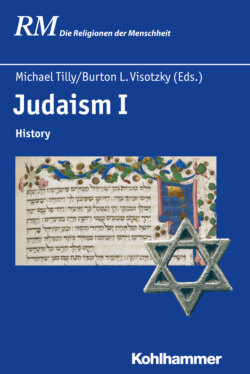Читать книгу Judaism I - Группа авторов - Страница 16
На сайте Литреса книга снята с продажи.
2 Jews in the West: From Herod to Constantine the Great
ОглавлениеThe story of the Jews from the Herodian kings until the advent of Constantine is explored by Dr. Natalie Dohrmann of the University of Pennsylvania. She looks at the rise of Judea as a Roman client kingdom under Herod the Great and the loss of Jewish political autonomy under the procurators, culminating in two devastating wars against Rome. She traces Jewish responses to the loss of the Jerusalem Temple, the priestly aristocracy, and the cult.
The chapter also examines the Jewish diaspora, parts of which fared poorly in this era. The Jewish community of Alexandria was destroyed in the early 2nd century—along with several other diaspora communities—when a wave of revolts in Jewish Mediterranean communities failed to defeat Trajan’s forces. Yet Jews continue to live and fare well in Rome, Antioch, and elsewhere. In Palestine, scholars are divided about the nature of the relationship between rabbinic Judaism and the Roman world. For the remainder of events described in this chapter, we do not have access to any Jewish source comparable to Josephus. Dohrmann reconstructs events from other people’s history, fragmentary material remains, documents, polemical materials by non-Jews, and religious, legal, liturgical, and other genres of literature never meant to tell history.
Dohrmann takes up the events between the destruction of the Jerusalem Temple in 70 CE and the Bar Kokhbah revolt of 132–135, considering the legal status of the Jews under Roman rule thereafter. She considers the role of Jews in the western Diaspora, describes the great Jewish centers in Alexandria and in Rome, and offers pagan perspectives on Jews and Judaism. She shares an aside on the Jesus movement and early Christianity, but then sharpens her narrative with the emergence of the rabbinic movement. Dr. Dohrmann concludes that Jewish history under pagan Rome represents perhaps the most radically transformative period in the history of the faith. Judaism shifted from a temple-based nation ruled by client kings and priests to a religion based on a sacred text, beginning to reorganize itself around a lay leadership in the form of the nascent rabbinic movement.
